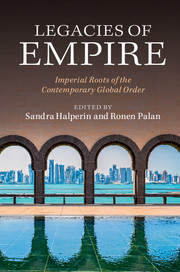Book contents
- Frontmatter
- Contents
- List of figures
- List of tables
- List of contributors
- Acknowledgments
- 1 Introduction: legacies of empire
- Part I Incomplete transitions from empires to nation states
- 2 Political military legacies of empire in world politics
- 3 The second British Empire and the re-emergence of global finance
- 4 Imperial city states, national states and post-national spatialities
- Part II Legacies of non-European empires in today's world
- Part III The future legacies of the American Empire
- Index
- References
2 - Political military legacies of empire in world politics
from Part I - Incomplete transitions from empires to nation states
Published online by Cambridge University Press: 05 August 2015
- Frontmatter
- Contents
- List of figures
- List of tables
- List of contributors
- Acknowledgments
- 1 Introduction: legacies of empire
- Part I Incomplete transitions from empires to nation states
- 2 Political military legacies of empire in world politics
- 3 The second British Empire and the re-emergence of global finance
- 4 Imperial city states, national states and post-national spatialities
- Part II Legacies of non-European empires in today's world
- Part III The future legacies of the American Empire
- Index
- References
Summary
This book examines the legacies of empire in world politics. It is about the imprint that the old imperial organization of world politics has left on the contemporary ‘international’ world. What erstwhile logics, institutions and organizational principles continue to work their effects? How, half a century on from decolonization, does the formal imperial world still shape relations between peoples and places? How might it still limit political possibilities around the globe?
In the social sciences and humanities, empire and imperialism usually appear under the signs of political economy and culture. When we think empire, we think of economic exploitation and Orientalism or, more mundanely, Indian restaurants on British high streets. What we do not think of are political military relations. An exception is the renewed interest in American empire that followed the invasions of Afghanistan and Iraq. This did not produce thoroughgoing, systematic inquiry into imperial security dynamics, especially as a path to understanding more general features of world politics. Broadly speaking, with insightful exceptions to the contrary, the political military imensions of empire and imperialism have not received concerted scholarly attention, or been seen as important topics outside of more or less arcane sub-fields.
This is striking when it is recalled just how frequently and violently people have resisted imperialism around the world. It is downright surprising when the historical consequences of that resistance are tallied.
- Type
- Chapter
- Information
- Legacies of EmpireImperial Roots of the Contemporary Global Order, pp. 27 - 45Publisher: Cambridge University PressPrint publication year: 2015
References
- 2
- Cited by



